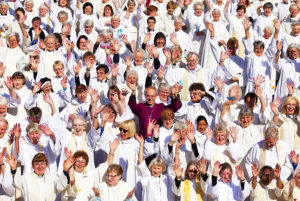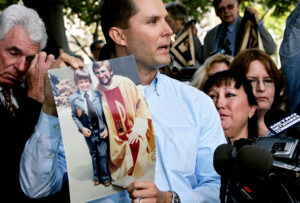My small children, being Hebrew speakers, call me abba. Originally Aramaic, the language of the Lord’s Prayer — “Our Father, which art in heaven” — abba is softer, more intimate than the English “father”. Perhaps slightly closer to “daddy”, though less nursery, less sentimental. To call God “abba” is to speak of God as a loving presence, not an austere despot.
So into that one word a whole pile of very deep stuff collapses — our relationship to the ultimate nature of things, our relationship to religion, our relationship with our own fathers. You don’t have to be Freud to find it unsurprising that Stephen Cottrell, the Archbishop of York, touched a highly sensitive nerve when he worried out loud that there might be a problem with “Our father”.
Many commentators inwardly groaned, spotting another depressing bout of Church of England wokery. And yes, the Archbishop did inevitably rehearse the idea that God is the apex predator of the patriarchy. But actually, what he said was worse than that. Much worse.
This is exactly what he said: “Yes, I know the word ‘Father’ is problematic for those whose experience of earthly Fathers has been destructive and abusive.” And he is clearly right that if your father beat or molested you as a child, then the word “father” will have disturbing connotations. But what the press did not pick up on was the fact that “Father” is also how many of the clergy style themselves. And if Father so-and-so abused you as a choirboy, then yes: “Our Father” may well be a problem.
In truth, things were already difficult for the Archbishop and the church he leads. For the current meeting of the General Synod in York has witnessed a crisis for the Church of England on an almost unimaginable scale — a full descent into acrimony and chaos, which will take a generation to recover from. “The Church often does the work of Satan,” one Priest wrote, after witnessing events unfold on Sunday.
He was referring to the Archbishops’ Council having decided to disband the church’s Independent Safeguarding Board, and sack its members. This is the body tasked with, among other things, looking into clerical abuse and supporting those who are victims of it. It is supposed to be independent because the Church of England has a long history of covering up its own mess. But it turns out that when its members say things that the Archbishops’ Council do not like, they can be fired and the board closed down.
As the Bishop of Birkenhead, the Church’s own deputy lead for safeguarding, put it: “Today the church is less accountable. To remove, at short notice, the strongest independent voices holding the CofE to account for its safeguarding failings makes us look resistant to robust scrutiny and challenge — which, of course, we are.” When the sacked Safeguarding officials were eventually able to speak — after much wrangling over whether they should be allowed to — they told the Synod that they had indeed been “silenced”. This is extraordinary. If the Church can silence its own Safeguarding body, what hope do survivors have?
Even under the full glare of synodical scrutiny, it was hard to get a straight answer. The Archbishop of Canterbury, Justin Welby, was asked directly if he had personally voted to disband the Independent Safeguarding Body. His reply indicated he has clearly been spending a lot of time around politicians (fellow Old Etonians, perhaps). “Both Archbishops wished to wait a bit,” he said, which gives the very strong impression that he and the Archbishop of York had voted against the move to disband. Later, under more pressure, the church admitted that they had both voted for it. Had it been made in the House of Commons, Welby might have faced accusations of misleading the House.
With all this in mind, let us return to Cottrell’s little aside on “Our Father”. As it happens, both of us get called Father by people to whom we have no relationship of biological kinship. It has taken me many years to adjust to this. Sunday-school children, at one of my early parishes in the Black Country, used to think it sounded hilariously like Farmer Giles. I didn’t.
But the main reason it sits uncomfortably with me is that it smacks too much of perhaps the deepest sin of the church: clericalism. Father knows best. At the time of the Reformation, clergy were known as “Sir”. In this country, it was only towards the end of the 19th century that Father became a widespread form of address for the Catholic clergy. It’s a kind of modern affectation. For the likes of Cardinal Manning, who promoted it, Father indicated some kind of exulted spiritual status, a special alignment with the ultimate Father, God.
This is odd when you come to think about it. Being celibates, Catholic clergy do not themselves father children — at least, they are not supposed to. Instead, Father indicates a spiritual kind of responsibility, akin to fatherhood, but not the same as it. Still, in some contexts, being called Father became, too easily, a mark of membership to a club — a club to which many lonely men without families would turn, for company, whiskey and good gossip. Personally, I love my membership of this club. But there is a shadow side to its exclusivity, which, to be clear, is nothing to do with its campery. One for all and all for one can ingrain a certain omertà, a sense that we look after each other through thick and thin, even when the clergy fail.
Of course, it is not just Catholics and Anglo-Catholics who abuse those in their care. Alleged perpetrators of abuse include 242 clergy, 53 church officers, and 41 volunteers who work with children. Creepy, charismatic pastors having secret “wrestling matches” with young men, or authoritarian evangelicals giving naked beatings to vulnerable adults – many of these were extremely well-connected people, with friendships at the highest level.
What was so depressing about the “Our Father” aside was not that it was woke, but that it was absolutely true. Those who are victims of abuse cannot trust the church. And what has been the official response to all of this? Yet another report has been called for. “Mistakes have been made,” the Archbishop of York admitted, “and we need to review that and learn from them”. As he was speaking, survivors were placing ribbons and posters on the fence outside, to remember victims. The next day, this little protest had disappeared.
The church is in total crisis, defeated by defensive managerialism and a clerical circling of wagons. On Sunday evening, many had had enough. The Director of Communications for the Anglican Communion, Gavin Drake, resigned from the Synod. “I joined the Synod to make the Church of England a safer place. I have failed, because the central machinery of the Church of England will use all its power to block the Synod from doing what it exists to do.” Many in the church are fast losing trust in our leadership. Because it is our spiritual fathers that are the problem — not our heavenly one.
Disclaimer
Some of the posts we share are controversial and we do not necessarily agree with them in the whole extend. Sometimes we agree with the content or part of it but we do not agree with the narration or language. Nevertheless we find them somehow interesting, valuable and/or informative or we share them, because we strongly believe in freedom of speech, free press and journalism. We strongly encourage you to have a critical approach to all the content, do your own research and analysis to build your own opinion.
We would be glad to have your feedback.
Source: UnHerd Read the original article here: https://unherd.com/



